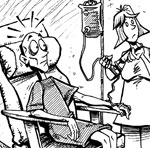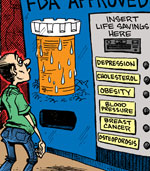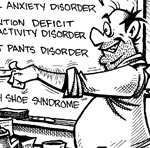The Serotonin Power Diet - Finally a Diet for Medication-Induced Weight Gain
| Share on Facebook | Share on Twitter | Share on Google+ |
Robert was diagnosed with type 2 diabetes, and his endocrinologist told him there was a wonder drug that would make controlling diabetes easy. Called Avandia, this medication would make his cells sensitive to insulin and literally suck the sugar right out of his bloodstream.
Robert started taking Avandia and the doctor's promises came true. His "impossible" diabetes became very easy to regulate, and he even found that he could sneak the occasional piece of pie or chocolate chip cookie and stay right on target. Avandia seemed like a wonder drug.
In a few months, however, Robert started noticing swelling in his feet. He got out of breath from walking upstairs. Even worse, he was gaining two pounds a week while almost—but not quite—perfectly following his diet, and he felt hungry all the time.
What doctors did not know at first, and didn't tell their patients even when the science was updated, was that Avandia worked by triggering a gene called PPAR-gamma. This gene transformed the stem cells that otherwise would become baby bone cells and baby blood cells into baby fat cells.
Avandia didn't make cells more sensitive to insulin so blood sugar levels would plummet. It made more fat cells so that collectively they would store any excess sugar in the bloodstream, and excess fatty acids, too.
In fact, fat cells are 300 times more efficient at storing excess fat than they are storing excess sugar. Millions of people who took Avandia gained 20, 30, even up to 100 pounds (10 to 50 kilos). And virtually all of them were scolded by their doctors for eating too much!
When you take a drug that turns baby bone cells and baby blood cells into baby fat cells, you tend to get osteoporosis and blood diseases, and you also tend to get severe problems with appetite. Fat cells are constantly binding insulin to transport sugar. This does not leave as much insulin to transport the amino acid tryptophan into the brain. Tryptophan is the building block of serotonin, the neurotransmitter that the brain uses to fend off depression. ( See tryptophan and serotonin.)
Avandia and many other drugs make you fat. And if that isn't depressing enough, they change your metabolism so your brain does not make as much serotonin, ensuring that you getter fatter, more tired, and more depressed, even if the drugs do what they are originally intended to do. When you eventually stop the drugs because of other side effects, however, the fat is left behind. What can you do?
The answer to medication-induced weight gain is the serotonin power diet. You can read whole books on the serotonin power diet (and The Serotonin Power Diet: Use Your Brain's Natural Chemistry to Cut Cravings, Curb Emotional Overeating, and Lose Weight by Judith J. Wurtman is a great investment), but the basic principle is simple:
This can be as simple as nibbling 5 or as many as 10 crackers before you eat a meal. The small amount of carbohydrate triggers insulin release from the pancreas. Then when your stomach digests the amino acids from the protein foods you eat an hour later, there will already be insulin in your bloodstream available to help the tryptophan in the food you eat enter your brain so it can make serotonin.
It's important not to eat any fatty food with your pre-meal snack, because fat competes with glucose for insulin. If you were to, for instance, have cheese and crackers before your meal, the fatty acids from the cheese would also have to be stored at the same time as the glucose from the crackers. But if you just eat a small amount of carbohydrate at your main meal, without stuffing yourself, your body is better prepared to send tryptophan to the brain.
There is a major advantage to eating this way. A small indulgence in carbohydrate now prevents cravings for a lot of carbohydrate later. Since carbohydrate cravings are the main source of excess calories in medication-induced weight gain, a snack now can save a binge later. And getting control over your eating is the first step to returning to your normal weight.
It's a lot better, of course, just to avoid medication-induced weight gain in the first place. Any medication for diabetes that was in common use before 2007 can cause weight gain. Most medications for depression and seizure disorders also cause weight gain. Obesity can become as significant a health challenge as the condition that was being treated.
But if you have already experienced serotonin-induced weight gain, control your calories, and make sure you get at one 50- to 100-calorie serving of starchy, high-carbohydrate food with every meal. Your brain will function better, and that will help you lose the weight that medications made you gain.
-
Skin CareMen Skin Care
-
Free ResourcesFree eBooks
-
Be careful in reading health books. You may die of a misprint.Mark Twain
-
Featured Health Supplement"...I also suffer from mild-to-moderate depression, so several months ago as an experiment I ordered a few bottles of the Neuro-Natural Serenity formula, but never took it consistently. However, I started taking it faithfully last week at full dose and already my spirits are lifting and I have a greater clarity of mind."
Cathi, USA -



















